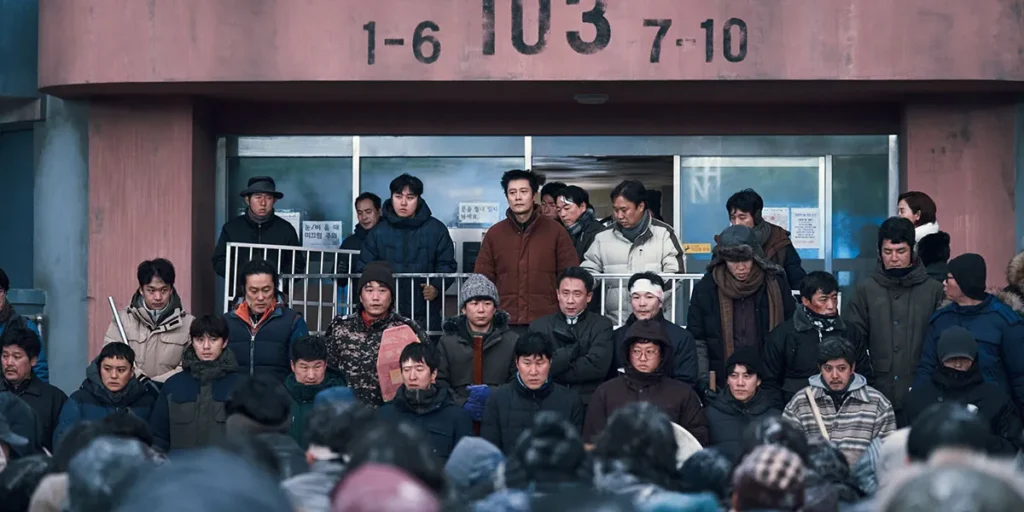
South Korea’s entry for the Best International Feature Film category at the 96th Academy Awards, Concrete Utopia is a strategic submission from the Korean Film Council, intentionally playing off the themes and ambition of the 2019 Oscar success of Parasite. If Bong Joon-ho’s social-economic viper of a film captured the Best Picture, logic would have it, writer-director Um Tae-hwa’s local disaster and impressive dark-comedy analog for the (global) housing crisis, Concrete Utopia, surely stands a chance in the less prestigious, but no less qualitative, international category. (Generally speaking, I’d argue the best films represented at the Academy are in the international category, not Best Picture.)
And they can’t be blamed for the motivated selection either. The latest star vehicle for Park Seo-Joon, who had a small role as Min-hyuk in Parasite and appeared most recently as Prince Yan in The Marvels, brings the technical prowess characteristic of the late-2010s and early 2020s South Korean blockbusters and recalls the biting criticism of the best films of the (earlier) Korean New Wave. The “utopia” of the title refers to the Hwang Gung Apartments, the last apartment building standing in Seoul– possibly the world, for all we know– after an earthquake. The residents of the building come to think of the surviving outsiders as “cockroaches” and support Yeong-tak (the ever-great Lee Byung-hun), the man with a mysterious past from room 902, in his rise to the role of building delegate. His rise to power is hardly fascistic—he risks his life running into a burning room to extinguish a fire—but his reign as the delegate could only be described in harsher language. He corrupts Park’s Min-seong (from room 602) and selects him to lead the Anti-Crime Force, a group that pirates and thugs from the apocalyptic survivors living in the gray concrete wasteland of Seoul. Under his authority, the building votes to evict all outsiders and to create an exclusive community built not on race, gender, or religion but on the luck of being a resident before the collapse of the city (or possibly even the world). The community is a community simply because they choose to be a community.
The marvelous destruction of Seoul shows only controlled fragments, biblical in scale. The earthquake comes with such instantaneity and certitude of death that it makes divine retribution a desirable alternative. Um refuses to delight in the destruction, and never makes a spectacle of it. The gray and blue leftovers of the once great capital appear extracted from the all-too-familiar recent newscasts of demolished urban centers like Mariupol and Gaza. Rather than indiscernible gray blobs, the same sort one would find in a cheaply made apocalypse video game or San Andreas, the fallen landscape of Concrete Utopia carries a history with it. The road surface markings, now divided vertically and pulled apart horizontally after the quake, were once clearly connected; the remnants of a church stand recognizable; the collapsed buildings, like carefully designed computer-generated dead bodies, make sense in their own fallenness.
The biblical scale comes by no accident: Christian themes are plentiful in Concrete Utopia. The entire story revolves around the Exodus myth, as director Um discussed in our conversation, with Yeong-tak twisting the prophetic role into something malignant. (Apparently, the character’s given name even translates as Moses.) Like Cormac McCarthy’s The Road, the post-apocalyptic story ends in a moment of grace fundamentally foreign and in painful contrast to the bleak and violent social collapse that precedes it. Unable to return to the now dystopian community of the Hwang Gung Apartments, Min-seong and his wife, Myeong-hwa (Park Bo-young), find shelter in a collapsed church under the glow of an impossibly in-tact stained-glass window. In the morning, a group of good-willed survivors find Myeong-hwa and take her back to their shelter: a large loft in a sleek modern apartment building in a fallen building. The room is flipped on its side with very little apparent damage; even the flatscreen on the wall appears unscathed. The world of concrete dystopia has been flipped upside down in this modern apartment of non-murderous normal people.
At its most political, Concrete Utopia finds the fascist project essentially anti-life and destined for a systemic collapse. In the German jurist Carl Schmitt’s infamous 1921 text On Dictatorship, the future Nazi philosopher argued for an Ausnahmezustand. Translated as “state of emergency” or “state of exception,” Schmitt argued that, to avoid social chaos, a head of state (or dictator) should have the right to suspend the law during times of emergencies—a legal basis that the Nazis would point to for philosophical support. The point, for Schmitt, was to avoid a state of chaos at any cost. Um’s film strips this to its insidious core, eliminating the false emergencies fascist governments have become so associated with—the myths and bigotry perpetuated by the alt-right to create an imaginary threat—and substitutes in a real emergency. It almost makes sense for a second, until he brilliantly uses the feeling against the viewer.
Concrete Utopia
2023
dir. Um Tae-hwa
85 min.
Opens Friday, 12/15 @ AMC Boston Common

